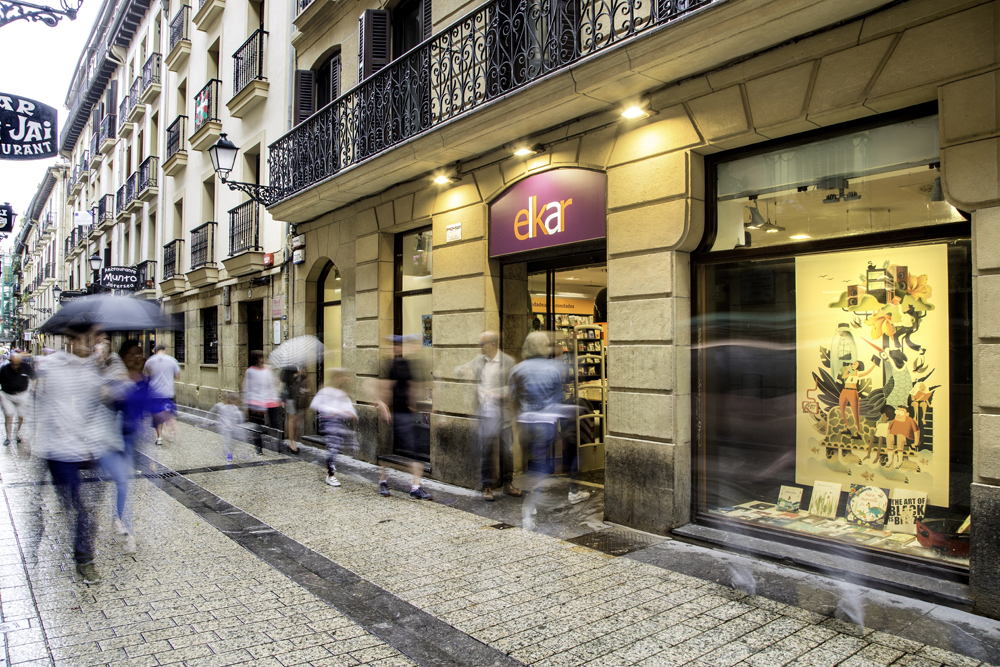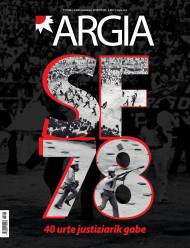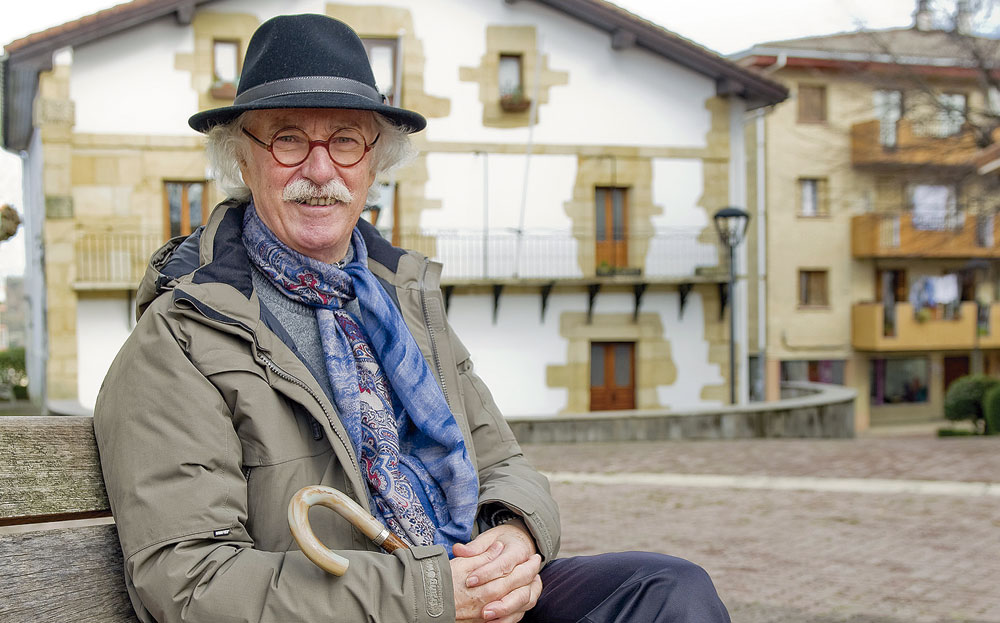The giant of Basque culture is also one of the great distributors of books of the Spanish State
- In recent years the Elkar Group has made major changes and as a result, among other things, it has become one of the State’s largest book-dealers. In June they have exposed to the press some of the latest strategic bets of the business conglomerate, offering a unique opportunity to perform an X-ray of the foundation that occupies a central place in the Basque culture.

On June 19, the Elkar Foundation convened journalists at the Barceló Costa Vasca Hotel in Donostia-San Sebastián. An extraordinary hearing took advantage of to inform the entire structure of the group and the business lines they have in place, providing data so far little known to the public. It is Elkar's second significant public appearance in a short time, as he previously asked the Siadeco research association to analyze the consumption of the Basque culture and presented in March the survey that has given much to talk: one of the main conclusions is that more than half of the Basques do not consume Basque culture.
The respondents to this survey were also asked about the public perception of the Elkar Foundation: 65% of the Basques have knowledge of the business group, but according to the explanations of the foundation president in Donostia, Joxemari Sors, “in most cases it is very limited and partial”. Here is one of the causes of the second exit to the plaza in a short time: “The importance of making public has been appreciated, even more so at a time when the world of culture, and especially the world of the book, is undergoing constant change,” reads in the introduction of the report distributed to the press workers who met around morning coffee.
On the next page you can see the map of the main business conglomerate of Basque culture: five publishers – plus two more participations – five distributors – four of them outside the Basque Country – 18 bookstores and other companies such as the printing press Leitzaran, part of an audiovisual producer, 10% of the television network Hamaika TB and the cultural park Martin Ugalde – the other. That's Elkar today. Group of 433 workers, with a turnover in 2017 above EUR 120 million, with a gross profit of EUR 4 million, without deducting depreciation, tax and financial expenses. The field of distribution is the main pillar of this large group.
Among the main distributors of the Spanish State
In particular, the Elkar branch last year invoiced a total of EUR 90,7 million, according to the data provided at Donostia-San Sebastián. And he has reported on something that has not been known so far: only 21% of that billing corresponds to the distribution made in Euskal Herria. Everything else is due to distribution outside the Basque Country: 79% – over EUR 71 million.
The distribution area is the main axis: last year it billed over EUR 90 million thanks to this activity
Elkar’s managing director, Mikel Esnal, explained the commitment they have made in the last five years, but before he highlighted the negative evolution of the book sector in the Spanish State between 2008 and 2016, with a decrease of almost a third in sales; in addition to the economic crisis, Esnal used the expression “pessimistic factor” to point out other causes such as the reuse of textbooks and digital teaching models. This is the context in which the Elkar strategy change took place, as explained at the Hotel Costa Vasca. They set out to be larger actors: “Being a player of Euskal Herria means playing in a small market dimension, being too small a player who is in a weak position.” Therefore, the expansive policy has in recent times guided the distribution line of the foundation and have made several bets in this direction: They have purchased the dispe distributor from Madrid and the Morcillo de Valencia, both dedicated to the distribution of books, didactic materials, games and stationery products.
The photography of the distribution that takes place outside the Basque Country is complemented by the “lifelong” companies of the Foundation, MCL, located in Barcelona, which works in Catalonia and the Balearic Islands; and ACL, in Madrid, which, in addition to this Community, reaches Castilla La Mancha, Castilla León, Asturias, Galicia, Aragon, Valencia and Murcia.
In recent years he has purchased a distributor from Madrid and another from Valencia, as well as half of the Uppali franchise
The Donostia-San Sebastian presentation did not mention another company, of which the foundation acquired half in 2015: 50% of the franchised business Uppali is owned by Elkar today. This is a new format that the Catalan distributor Abacus launched two years earlier and is aimed at the creation of shops selling children's books, toys and crafts materials. Parallel to the network, you can also buy textbooks and narratives in the chain that is opening shops throughout the Spanish state, as was the case of the publication in November last year of the opening of five new stores in Aragon for 2019.
Elkar has also innovated in the warehouses, centralizes in San Sebastian to those of Madrid and Barcelona, makes important investments in machining… All together – buying companies and changing warehouses – has cost 24 million euros the change of strategy. It cannot be denied that it has obtained good results, as the numbers published on June 19 have increased by 95% in the distribution sector between 2012 and 2017, being close to the leadership of the Spanish State's book dealers, who are the first in billing.
Paper giant
In addition to
the 18 Elkar branded bookstores, 20 other stores use the group management system
In Euskal Herria, there has been no lack of movement in recent times, as Kepa Matxain published in issue number 2.603 of this journal: Elkar has purchased the Bitarte dealer and this operation has to do with the closure of the Auzolan library in Pamplona, which was part of the Navarra distributor. Esnal explained at the San Sebastian hearing that the interviewers will continue working The benefits of the treatment are: “It’s time to join forces. We are pleased to have reached an agreement.”
One of the keys to the purchase and sale of books is the relationship between stores and distributors. In addition to having its own points of sale – with the exception of Zuberoa and Baja Navarra, it has a presence in all the provinces – Elkar has launched a new formula in the last four years, called “friendly shop”. Another 20 bookstores are integrated into this network. What does this mean? They replace the previous management system with that of Elkar, allowing them to work “with excellence”, according to the managing director, but maintaining “all autonomy”, at least to the extent that it allows them not to have their own management system.
Elkar has put the spotlight on street shops, seeing that the chances of competing in net sales are lower. In this field, there are those who: last year the bookshop sector had a market share of 34.5% in Hego Euskal Herria, growing almost three points above the sector average.
The market share of Elkar stores in Hego Euskal Herria was 34.5% in 2017 and is growing more than in the sector
The business group under the umbrella of the Foundation looks like a paper giant, as most of the billing is linked to books and bets in other formats have not given it the desired result. This may explain another announcement that was made in that presentation: Elkar.eus that will stop selling e-books through your online store. To explain the decision, they made the press aware of the polarization that has occurred in the market of numerical books: either “piracy” or the “giant we all know”, that is, Amazon, and they have chosen not to have many options outside of them, even believing that the sale of readers did not make much sense: “EITB is as if it started selling television sets,” Joxemari Sors said when asked about the decision. In any case, the editorials of the group will continue to publish in digital format and the readers will be able to buy these books through the editorial website.
New role of the editorial Txertoa
Compared to other business lines, Elkar publishers have lower invoicing rates, 8% of the total group, but their weight in the Basque book sector is indisputable. One in every five books edited belongs to the Foundation's publishers and there have also been changes in them. The highlight is the Vaccine and the role division of Ttarttalo. From now on, Txertoa will take care of the adult books that Ttarttalo has published so far and this second editorial will specialize in publishing children's works.
The wager on e-books has not given the expected result, so they will stop selling them in their internet stores
The vaccine seems to regain the weight it has historically had. It has been underway since 1968, that is, it is prior to the editorial Elkar itself; but for several years it has lacked a well-defined line, depending on the moment it has published essays in Spanish, infantile biographies or cookbooks. Now it seems that it will have a more concrete framework, essays in Basque and Spanish, works by Basque writers who speak in Spanish and translations of Basque writers. The change was already noticed in the last edition of the Durango Fair, as it made available to erdales readers the translation of Lander Garro's novel La Petite Guerra. The last two attempts published in Euskera, Telesforo Monzón de Pako Sudupe, aristocrat nationalist and Tretatxu de Hektor Ortega, governor of the robbers, have given much to talk – the second report was published by Urko Apaolaza Avila in number 2.599 of ARGIA. Siege to the Basque of Joan Mari Torrealdai, a volume of over 400 pages that has been completed The Black Book of the Basque Country 20 years ago.
The Elkar group, at its hearing in June, made many data, lines of work, companies and strategic bets available, enough to draw conclusions. The most obvious thing is that from the moment a book is produced until the buyer acquires it, through the distribution network and the store, the foundation companies have a lot to say in the entire product chain. And in some cases, in the distribution, it is not the position of force that is limited to the Basque Country. The group used this presence to reclaim other cultural policies. The director of the editorial Elkar, Olatz Osa, said that they have launched a “reflection at home” on this issue and that they will share conclusions with other cultural agents. It therefore appears that the public work opened with the Siadeco study will continue later.












